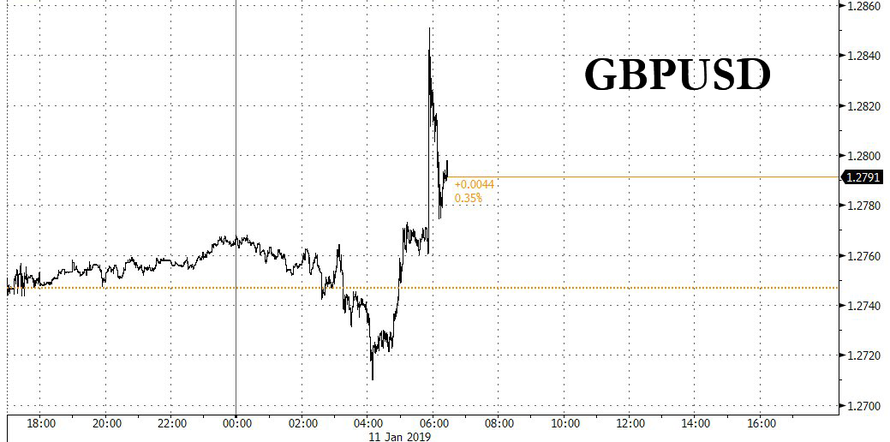Brexit Day is less than three months away and never during the process has the UK’s fumbling attempt to organize an ‘orderly’ exit from the trade block looked more fraught with conflict and chaos. After returning from their holiday break this week, MPs promptly rebelled against the government, passing a series of amendments over objections from the government that will make it extremely difficult to run down the clock to force MPs to either hold their noses and accept the deal she negotiated with the EU, or risk the pandemonium that could follow a ‘no deal’ Brexit.
With circumstances finally starting to shift this week following months of deadlock, murmurs about the possibility of delaying Brexit Day have grown ever-louder. Which is why it’s hardly a surprise that, on Friday, an anonymously sourced report in the Evening Standard cited “senior cabinet officials” claiming Brexit Day would likely be delayed sparked a brief rally in the pound.
GBP/USD climbed as much as 0.8% to $1.2851, leaving it on track to strengthen for a fourth-straight week.
In the report, ES’s sources pointed out that the withdrawal treaty isn’t the only long-running controversy that must be brought to a conclusion before Brexit Day. There are at least “six essential bills” that must be passed before Britain leaves the European Union.
Heres’s a quick rundown of that, and two other controversies that stand in the way of a workable Brexit:
- Senior ministers told the Standard that a majority of the Cabinet now support the idea of staging indicative votes in the Commons to see if a different Brexit plan is supported, despite Theresa May publicly opposing the idea.
- Work and Pensions Secretary Amber Rudd refused three times on live radio to deny she would resign if the Prime Minister attempted a disorderly departure from the EU without securing a withdrawal deal.
- Foreign Secretary Jeremy Hunt warned that “Brexit paralysis” was a risk if MPs vote down Mrs May’s deal on Tuesday but lack a majority for a different deal. He said it was clear that a no-deal Brexit would be blocked by Parliament following the landmark votes earlier this week.
While a delayed Brexit deadline would be positive for the pound, it would not be a “big game changer” due to the lack of clarity around what Parliament wants, said Mikael Olai Milhoj, analyst at Danske Bank.
“Positive as it means lower probability of no-deal Brexit, but should not be a big game changer”.
The rally started to fade as Theresa May poured cold water on the reports, saying there is not such plan in place and that the government’s policy is not to delay the UK’s departure from the EU.
via RSS http://bit.ly/2smg1ox Tyler Durden
